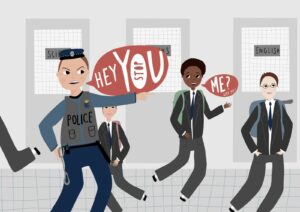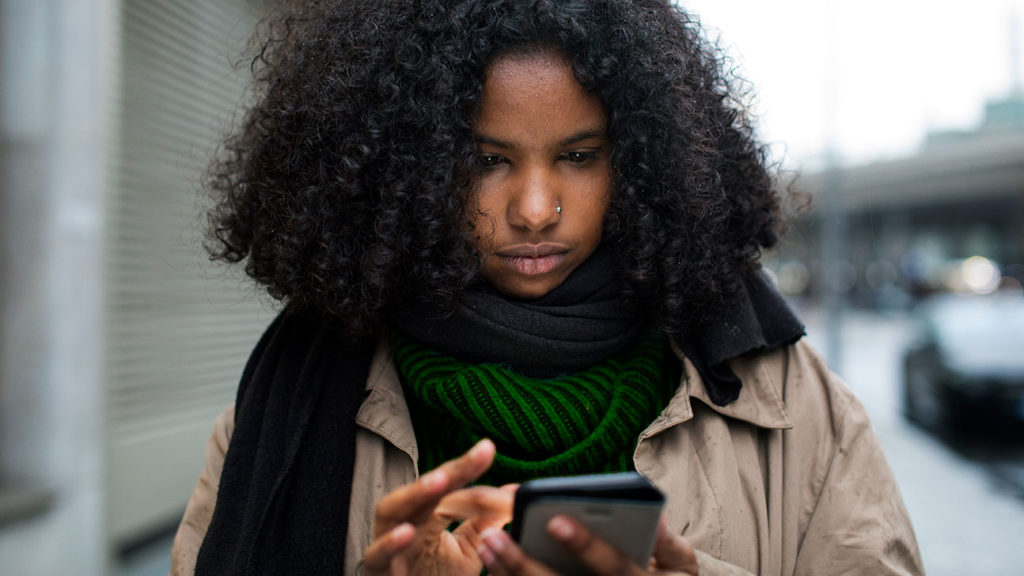Racialized trauma is a trauma that usually people of color experience. This type of trauma is caused by the way society views race and the different ways in which people are treated because of their race, usually an extension of racism. These traumatic experiences have been found to have lasting effects on mental health. Let’s explore what causes these traumas, how they manifest themselves in everyday life, and what you can do to help heal from them.
Contents
- 1 What Is Racialized Trauma?
- 2 Signs Someone Is Facing Racialized Trauma
- 3 Where Does It Come From?
- 4 Examples Of Racialized Trauma
- 5 How Does Racial Trauma Manifest Itself in Everyday Life?
- 6 Ways to Heal From Racial Trauma
- 7 Treatment For Coping With Racialized Trauma
- 8 Why Addressing Racial Trauma Is Important?
- 9 Tips For People with Racial Trauma
- 10 Conclusion
What Is Racialized Trauma?

Racialized trauma is a type of trauma caused by repetitive and ongoing traumas that people of color experience in their lives due to the way society views race and racism. This type of trauma can be experienced both directly and indirectly. For example, if someone experiences racist violence such as hate crimes, sexual violence, etc., they could also experience racialized traumas indirectly because these situations cause family members and loved ones to feel threatened.
When it comes to interpersonal traumatic experiences, racialized traumas are often ignored or dismissed. This can be due to the fact that there is a lack of resources and racialized trauma-specific therapies. Racialized trauma refers to any form of racism (i.e, systemic, interpersonal, internalized) that is experienced as traumatic. This includes experiences such as discrimination, harassment, incarceration, police brutality, and witnessing violence against others based on race.
Signs Someone Is Facing Racialized Trauma
Oftentimes, racialized trauma is not recognized. The different signs someone may be experiencing racialized trauma are-
- Nightmares
- Unusual behavior
- Sudden changes in mood
For example, if someone is dreaming about the traumatic event that occurred to them, they may be experiencing these dreams because their subconscious is trying to process the events that happened. If someone doesn’t know how they’re feeling or what’s happening, they may be experiencing racialized trauma. This can also happen if someone has sudden mood swings or changes in attitude without any logical explanation.
Where Does It Come From?
Racialized trauma can come from a variety of different places. It can come from personal experiences, such as experiencing racism or witnessing violence against others. It can also come from larger institutions, such as the government or the media. For example, the way the government treats people of color can often lead to traumatic experiences. This is because the government may enact policies that are racist or have a negative impact on people of color. The media can also contribute to racialized trauma by perpetuating stereotypes and racist narratives about people of color.
Examples Of Racialized Trauma
 It is important to note that the term “trauma” has been used in various ways across disciplines. For some, trauma is defined as an event that overwhelms a person’s ability to cope or integrate the emotional impact of the event. This definition broadens the concept beyond post-traumatic stress disorder (PTSD) to include prolonged, unresolved stress that may result from exposure to an event or events that threaten life, bodily integrity, self-worth, or other things one cherishes. For others, the term “trauma” applies to a subset of traumatic events that are particularly shocking and arousing because they involve actual or threatened death or serious injury.
It is important to note that the term “trauma” has been used in various ways across disciplines. For some, trauma is defined as an event that overwhelms a person’s ability to cope or integrate the emotional impact of the event. This definition broadens the concept beyond post-traumatic stress disorder (PTSD) to include prolonged, unresolved stress that may result from exposure to an event or events that threaten life, bodily integrity, self-worth, or other things one cherishes. For others, the term “trauma” applies to a subset of traumatic events that are particularly shocking and arousing because they involve actual or threatened death or serious injury.
Race-based Traumatic Stress (RBTS)
Race-based traumatic stress (RBTS) is a form of trauma that is specific to people who experience racism. This type of trauma can lead to mental health issues such as post-traumatic stress disorder (PTSD), depression, anxiety, and substance abuse. People who experience RBTS may feel like they are constantly under attack, and they may have trouble trusting other people. They may also find it difficult to focus on anything other than their race. If you think you may be suffering from RBTS, it is important to seek help from a therapist or counselor.
Race-based traumatic stress (RBTS) can be caused by one or more of the following three types of events:
1. Interpersonal acts perpetrated by individuals (e.g., physical, psychological, sexual assault; harassment; domestic violence).
2. Institutional acts perpetrated by institutions (racial profiling; discriminatory hiring/employment practices; schools tracking students into different “tracks”)
3. Political acts perpetrated by the government (segregation; restrictive covenants; enslavement).
RBTS can occur in any sector of society (e.g., healthcare, mental health, social work, education, community agencies). However, it is most common in people who are racially/ethnically marginalized in society (e.g., people of color; indigenous populations; Lesbian, Gay, Bisexual, Transgender, Queer [LGBTQ] populations). RBTS can also occur in people who get discrimination from society because of other aspects of their identity that intersect with their race or ethnicity (e.g., religion, social class, language).
How Does Racial Trauma Manifest Itself in Everyday Life?
I’m sure that you’ve probably experienced some sort of racist trauma in your life whether it’s a racist incident you directly experienced or it’s a situation that one of your loved ones has experienced. You might be wondering how these traumas can affect us on a daily basis and manifest themselves in our day-to-day life. These racialized traumas usually manifest themselves as symptoms such as-

- Anxiety
- Depression
- Hypervigilance
- Restlessness
- Paranoia
Other effects are having difficulty concentrating, nightmares or flashbacks of traumatic events, extreme emotional distress or numbness, etc.
Many people tend to push these traumas aside and pretend like everything is okay- which isn’t the way to go. When someone is dealing with these traumas, they can impact a lot of different areas in their life including their emotional, behavioral and physical health. These traumas can affect these individuals both psychologically and socially.
Ways to Heal From Racial Trauma
Now that you’ve identified some ways in which racial traumas might affect your day-to-day life, it’s time to figure out how you can heal from them. It’s important that you acknowledge the fact that all traumas are valid and need to be healed in their own way, but healing is different for everyone. I’m going to list some ways that have helped me when it comes to healing racialized trauma.
1. Have a support system
You need to have people in your life that you can talk to and connect with. Creating strong ties with others helps because it creates the opportunity for you to express yourself and share your experiences without feeling guilty or shameful. Having people around who can listen to what you’re going through is one of the best ways to heal your traumas.
2. Take time to process
It’s important that you allow yourself time to process what happened so you can move on and heal. When someone tells me about their experiences, I always say-
“it’s okay if you don’t want to talk right now, it’ll come back up again when the moment is right.”
You need to take time to process what happened so you can overcome it. Until then, it’ll be affecting your daily life and emotions- which is the last thing you need when recovering from trauma.
3. Practice self-care
Taking care of yourself is so important when recovering from any type of trauma. This includes making sure you’re eating a healthy and balanced diet, getting enough sleep, exercising, taking time for yourself. These are just some of the ways that help me when it comes to coping with my trauma.
4. Educate yourself on your experiences
Even though this may not be easy at first- learning about what happened helps because it allows you to understand the situation and gives you a better idea of what happened and why. It can also help you determine how to move forward in your life.
5. Block out the negative energy
I know it’s easier said than done. But try not to pay attention or give any attention to people who are trying to push their negative beliefs onto you. Blocking out the negative energy can go a long way when you’re trying to heal from trauma.
Treatment For Coping With Racialized Trauma

Many people experience traumatic events throughout their lives. But very few talk about the effects of racialized trauma. This type of trauma usually manifests as a person’s anxiety, depression, hypervigilance, restlessness, and paranoia.
A therapist is a professional who provides direct treatment for problems that are causing psychological distress. A good therapist can be a guide who helps you understand and manage your feelings better so that you feel less afraid and stressed out.
Therapy for coping with race-related trauma involves working through painful experiences, gaining insight into the historical context of those events, and learning how to cope with stress and emotions more effectively.
The focus of therapy is on how to soothe yourself, recover from traumatic experiences, and build resilience.
Therapy
A therapist can help you process your feelings about racial trauma by examining what happened, how it affected you personally, and what coping strategies are most effective. Therapy may also include psychotherapy or medication.
The focus of therapy is on how to soothe yourself, recover from traumatic experiences, and build resilience.
Other treatment options

Support groups: Meeting with others who have had similar experiences can help validate your emotions and provide a sense of community. There is strength in numbers.
Art therapy: Taking time to express your feelings through art can be healing for the mind, body, and soul.
Music therapy: Listening to music that expresses your feelings can help you express difficult emotions, while also providing a positive distraction from negative thoughts.
Meditation: Learning how to meditate can be helpful in coping with stressful situations. Meditation focuses on breathing, mindfulness, and positivity, which are all tools that can help manage stress at the moment.
Self-care: Taking time to care for yourself can be an important step in coping with trauma. Self-care includes making sure you’re eating healthy, exercising regularly, and getting enough sleep at night.
Why Addressing Racial Trauma Is Important?
Addressing racial trauma means exploring the following:
What happened? How did it impact you and others? What coping strategies are most effective? How can we process these traumas and move forward as a community to help prevent future racist acts and violence? Answering these questions is an important step in dealing with racism and its consequences.
Some of the emotions people may feel when subjected to racial trauma are fear, anger, shame, and powerlessness. Racialized traumas can pose a risk for mental health issues such as anxiety, depression, hypervigilance, or paranoia.
Racial Trauma is not always easy to talk about because most people don’t think it’s a significant issue. However, this type of trauma can contribute to mental health issues such as depression and anxiety.
It is important to note that accepting your feelings and finding ways to express them effectively could lead to stronger self-esteem and increased life satisfaction over time.
Tips For People with Racial Trauma
 When it comes to dealing with racial trauma, it is important to remember that not everyone will react the same way. It’s also worth noting that having a support system can help.
When it comes to dealing with racial trauma, it is important to remember that not everyone will react the same way. It’s also worth noting that having a support system can help.
When working through your feelings about racial trauma, you may find the following tips helpful:
- Identify what happened and identify potential coping strategies.
- Seek professional advice if you are experiencing a lot of distress.
- Remember that you are not alone and that there is a support system available.
- Know that confronting a traumatic experience can lead to increased self-esteem, positive coping strategies, and more life satisfaction overall.
Conclusion
Racialized trauma is a global issue that needs addressing. And individuals can help by educating themselves, sharing their knowledge with others, and taking action. As we come together collectively as communities of allies who want to heal from racialized trauma, its effects will lessen over time. If you are looking for therapy or treatment for racial trauma, reach out to our team today and get the best possible treatment.
For more information, please contact MantraCare. PTSD or Post-Traumatic Stress Disorder is a mental health condition that affects people who have experienced or witnessed a traumatic event. If you have any queries regarding Online PTSD Counseling experienced therapists at MantraCare can help: Book a trial PTSD therapy session


